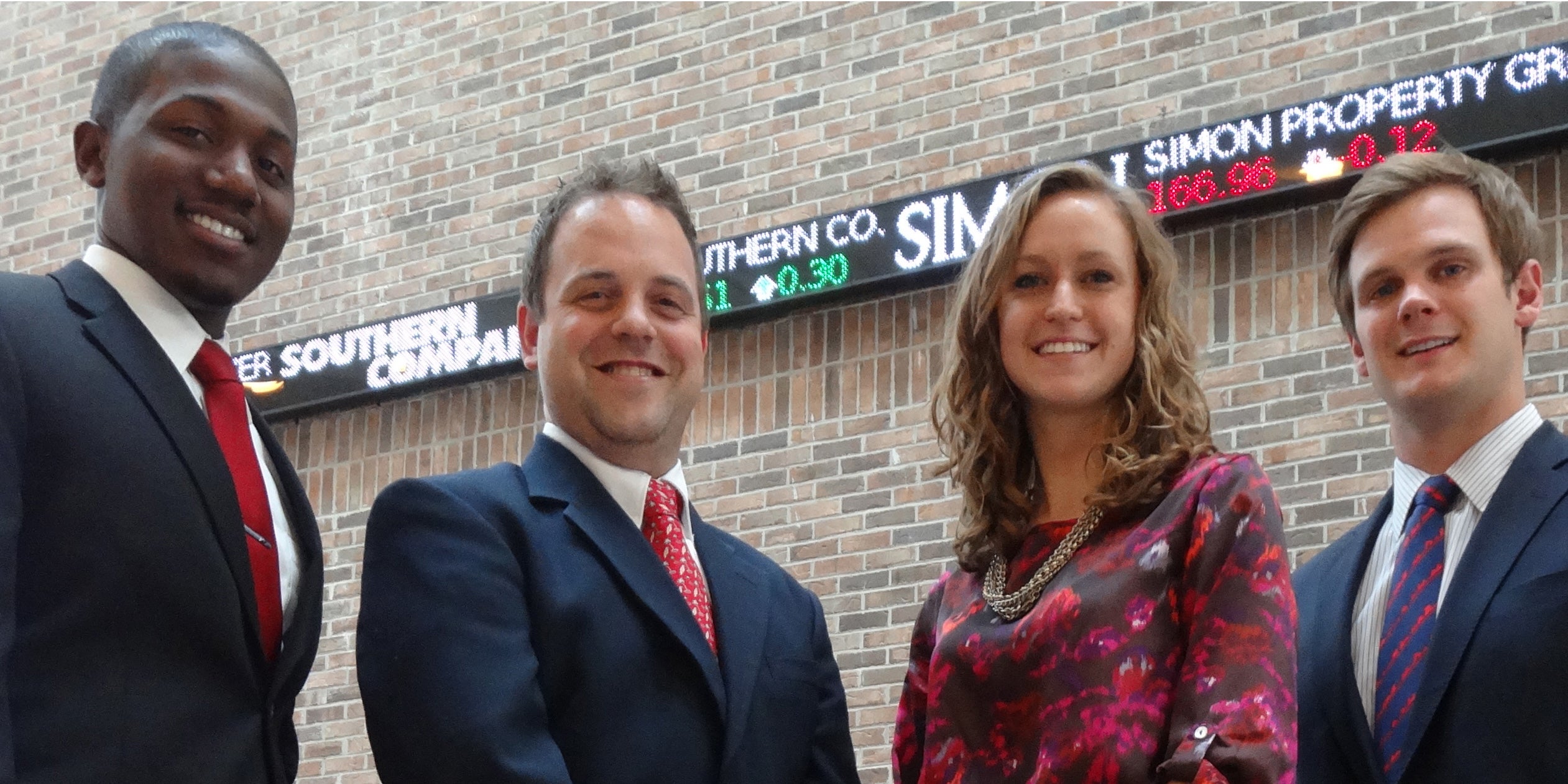Every Tuesday and Thursday afternoon, Room 216 in the College’s of Charleston’s Beatty Center takes on the feel of a Wall Street investment firm.
Associate Professor of Finance Mark Pyles stands in front of the tiered classroom, calling on different students to report the conditions and financial trends in various industries and financial markets around the world.

From left to right, senior James Mitchell, Finance Professor Mark Pyles, senior Alaina Watkins, and senior Eric Bannerot.
The students sound like seasoned financial analysts and researchers as they rattle off details about the U.S. Consumer Price Index, political unrest in Venezuela, and labor strikes in Germany, among other topics.
One student advises keeping a close eye on Apple’s ongoing talks with Comcast. Another draws attention to recent comments by Fed Chair Janet Yellen.
The students also look the part, dressed in business attire and confident and poised in their remarks. Around the room, every student has a laptop or tablet open showing charts, graphs and financial news headlines.
This is the School of Business Investment Program. Pyles is the program’s director.
‘Calculated Risks’
When he first came to the College nine years ago as a newly minted professor, Pyles could not have imagined that he’d be managing an investment program that provides real money to a class full of twenty-somethings to invest as they see fit.
“I didn’t think we would be a school that would be able to offer this opportunity,” Pyles said. “It takes an administration and a donor willing to look beyond a textbook.”
The program began in January 2013 as a result of a $540,000 gift from College of Charleston parents Steve and Maureen Kerrigan. Each semester, $50,000 is allocated for students to invest. Any profits stay with the fund.
Read more about the of the School of Business Investment Program.
The College’s investment program is unique among business schools not only because the money being invested is real but also because students have the flexibility to invest in both public and private assets. That means there’s more risk and more opportunity.
The first cohort of students entered the program in Fall 2013 and the first trades were made in October 2013. Through the first quarter of 2014, the class’ investment portfolio outperformed the S&P 500 by almost 2.4 percent.
 “It’s a little easier to take the calculated risks since it is not my own money,” said senior business administration major James Mitchell. “But the desire to pick good stocks that contribute growth to our portfolio keeps me, as well as the class, from doing anything too risky.”
“It’s a little easier to take the calculated risks since it is not my own money,” said senior business administration major James Mitchell. “But the desire to pick good stocks that contribute growth to our portfolio keeps me, as well as the class, from doing anything too risky.”
All About Jobs
The class consists of 20 seniors, each carefully selected for the program through a competitive application process overseen by Pyles and the program’s advisory board.
The program seeks students representing a variety of academic majors. Case in point is Alaina Watkins, who is majoring in historic preservation with a minor in hospitality and tourism. She is the program’s communications director, overseeing publicity and event planning.
“Professor Pyles runs the class like a business,” Watkins said. “In business, you have to hold yourself and others accountable. That’s the way it works in the real world.”
In the real world, Watkins was recently accepted into a global management-training program with Marriot Hotels.
Post-graduation also looks good for Mitchell. He’s accepted a management trainee position with Norfolk Southern.
Back in the classroom, Mitchell and Watkins are delivering a detailed presentation about AT&T, including its history, services and business practices. Their task is to arrive at a valuation of the company’s stock and to recommend whether the class should buy shares. Their determination is that the stock is undervalued, and they rate the asset as a strong buy.
The class peppers Mitchell and Watkins with probing questions. The ensuing discussion touches on everything from the effects of the Edward Snowden leaks on the telecomm industry, to the phone company’s early history as a monopoly, to advances in smartphone technology.
Senior finance major and portfolio manager Eric Bannerot is bullish on AT&T’s stock and works to convince his classmates that it’s a good investment. A member of the Honors College, Bannerot completed an internship with a hedge fund in New York over the summer. His internship experience coupled with the investment class gave him a leg up as he interviewed for jobs in the financial industry. He recently accepted a position with a hedge fund in Greenwich, Conn.
It’s time for the class to vote on AT&T. The paper ballots are unanimous: The class will invest approximately $5,000 at $35.20 per share.
Pyles seems pleased with the decision, though he is careful to not attempt to interfere in the decision-making process. The students hold sole discretion over portfolio decisions. The detailed analysis and thoroughness of the AT&T valuation reflect the same fundamental approach the class has applied to its investments all year long.
“We want to at least exceed the market return,” Pyles said. “And in the early run, we have done that more than not.”
It’s natural that an investment class will be focused on the bottom line, but Pyles said the most important outcome is the one that comes after the students graduate.
In fact, the focus on jobs is so important that the program now requires students entering the program to have already completed an internship. The 20 seniors who made the cut for next year’s class come with impressive internship credentials and boast an average GPA of 3.6.
“It’s not just about walking across the Cistern at graduation,” Pyles said. “It’s about where you go afterward.”






